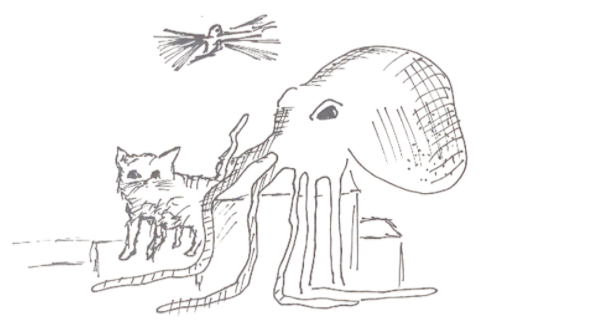
Junior neuroscience major Catherine Droesch has always loved animals. That’s probably because of her family’s 21 pets and scores of fish. She knows everything about them: their diets, exercise, sleeping habits, environment and much more. One thing she’s picked up on throughout her years as an animal owner is that a pet’s care needs to be enriching.
“Enrichment is a way that we can give our pets an environment that is more like what they experience in the wild, and that is more stimulating for them,” Drosech said.
The lifelong animal lover credits her neuroscience major with allowing her to learn more about her pets’ enrichment.
“I think that as a neuroscience major I am thinking a lot about how people and animals think and how their brains work, and because of that I consider it important for all humans and all animals to be happy and using their brains for smarts,” Droesch said.
This semester, Droesch is taking a dog psychology class called Experimental Research in Cognitive Psychology, taught by professor Ellen Furlong. Droesch applies the principles in that class to caring for her dogs and her other pets.
In one lesson from the course, she learned how important dog walks are for stimulating a dog’s sense of smell. In another lesson, she learned the importance of training pets to do tricks, stemming from the behavioral psychology concept of learning conditioning.
In the same vein, Droesch learned about operant conditioning, which focuses on reinforcing good behavior and ignoring bad behavior rather than punishment.
She puts these principles into practice with Flynn, her pet bunny, and always places emphasis on what he does right.
Droesch says that pets like bunnies are very food-driven, so she gives Flynn a treat for doing well on a trick or for doing something that he doesn’t like, such as being picked up or groomed.
“I usually pet and praise him, but I think the treats are most reinforcing for him,” she said.
Droesch also enriches her pets by hiding treats in toys. For her dogs, she created a “puzzle toy” where she places treats in a muffin tin with tennis balls on top.
“It’s fun for them to try and get it out and sometimes we put treats under traffic cones. It’s a better way for them to get treats because it’s using their brain,” Droesch said.
The dogs aren’t the only ones who are challenged to find their treats. She also uses a variety of different toys to hide treats for Flynn, including a veggie mat and a couple of types of spinning toys. She compares this type of enrichment to foraging.
Another type of enrichment comes from traditional play, something that is important for her cats.
“We of course have cat toys for them to play with and like most cats they enjoy batting around things like water bottle caps and rubber bands possibly even more than they love playing with toys. We also have them chase around a string sometimes, which they love,” Droesch said.
Droesch also makes the environment in her house enriching for her cats. Cats in the wild climb a lot, so we have a couple cat trees throughout the house and the cats have many different levels to jump around on from our furniture as well.”
Droesch’s enrichment doesn’t stop at pets with fur. She also has methods of enriching aquatic animals, which she says are harder to come up with ideas for.
“There’s not a lot you can do for turtles and fish, but giving them different food and plants and their environment is actually enrichment for them,” Droesch said. “We might not think of it but it is. I want all of my pets to be happy so I find ways for all of them to be enriched.”
Droesch is continuously finding more ways to improve all of her pets’ well being. She is already planning her next project.
“Something else that I would like to try soon is to train my cats to do tricks. I had never realized that cats would do tricks, but they can, so I’m excited to try after I do a bit more research.” Droesch said.
Whether it is from her personal research on pet care or the concepts from her neuroscience and psychology courses, Droesch’s number one goal is for all of her pets to be happy.

